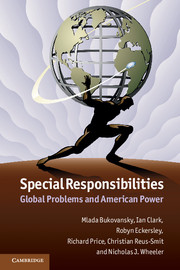1 - A practice in search of a theory
Published online by Cambridge University Press: 05 June 2012
Summary
‘The grading of powers is a matter of theory’, Martin Wight once remarked, whereas the ‘managerial function of the great powers is a matter of practice’. Special responsibilities erode this distinction: they are about the grading of powers, as well as their managerial functions. Accordingly, this chapter traces how special responsibilities came to be developed in both theory and practice. At its heart is to be found the complex interplay between the category deemed to be special, and the nature of the responsibility that is as a result attached to it. Special responsibilities first arose within a traditional and European-centred states system. In that context, it was the seemingly fixed category of the special that attracted attention; subsequently, a more reflexive understanding of responsibility has led to a more fluid understanding of those who are to be considered special, and for what specific purpose. This fluidity has tracked the more complex global system that has evolved in the meantime.
This chapter clearly demonstrates that there was a practice of special responsibilities long before there developed any coherent ‘theory’ to account for it. When a theory began to emerge, it was one that largely emphasised a responsibility attaching to a pre-existing group of states, namely the great powers. That the explanation and justification took this particular form, rather than something else, meant there were a number of significant consequences. Any attempt to make sense of special responsibilities must therefore begin with a brief history of its practice, and how this subsequently came to be engaged in the International Relations (IR) theory literature.
Information
- Type
- Chapter
- Information
- Special ResponsibilitiesGlobal Problems and American Power, pp. 25 - 50Publisher: Cambridge University PressPrint publication year: 2012
